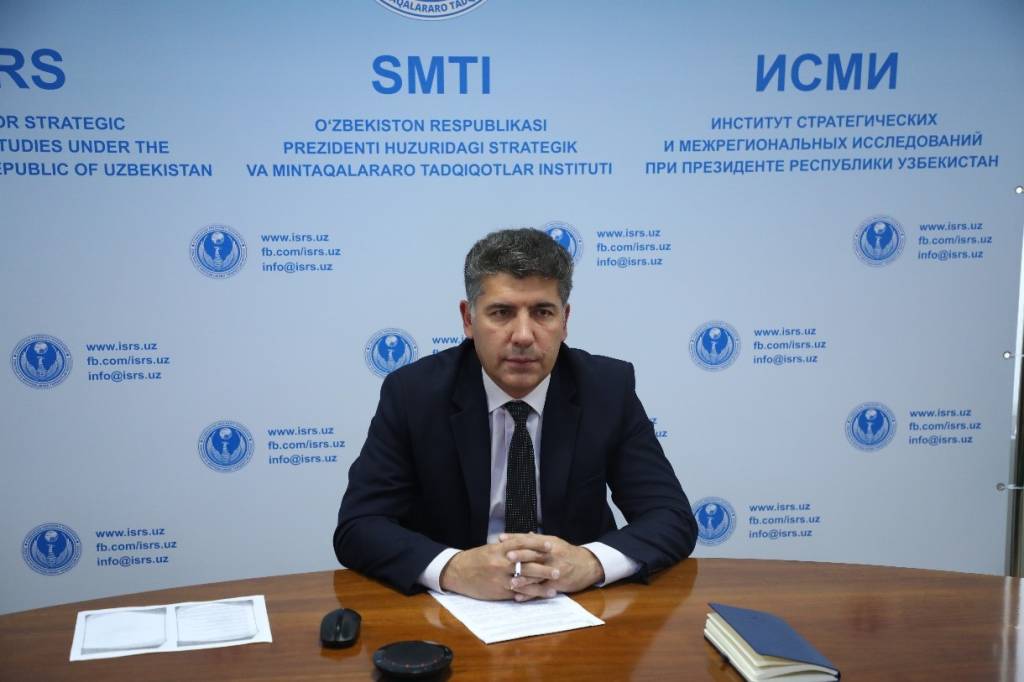A.Nematov: The trend towards regional cooperation has become sustainable

Speaking at the roundtable on "Central Asia in a Changing World: Toward the Fifth Anniversary Consultative Meeting of the Heads of State," Akramjon Nematov, First Deputy Director of the Institute for Strategic and Regional Studies under the President of the Republic of Uzbekistan, noted that the Consultative Meeting of the Heads of States of Central Asia launched in 2018 at the initiative of Uzbek leader Shavkat Mirziyoyev became an important platform for strengthening cooperation among the countries of the region.
At the same time, in his words, the holding of the fifth meeting in September this year is an obvious evidence that the trend towards regional cooperation has become sustainable, and the chosen format of interaction has established itself as a demanded mechanism for organizing a trusting and constructive dialogue, elaboration of coordinated approaches to solving common issues for our countries.
On the other hand, the expert is sure, this also speaks of the strong interest of the Central Asian states in the further expansion and deepening of regional cooperation.
And today, in conditions when the world is undergoing a profound transformation, accompanied by an aggravation of geopolitical confrontation and confrontational rivalry, such interaction is becoming even more in demand.
"We are witnessing an increase in geo-economic competition, increased protectionism, the formation of economic blocs, and a new configuration of production and supply chains. The level of interstate cooperation in solving the issues of the global agenda, which also relate to the problems of extremism and terrorism, climate change, energy, food and information security that are topical for our region, is decreasing.
It is obvious that all these processes will have a long-term character, the geopolitical and geo-economic conjuncture will continue to transform radically, affecting the architecture of regional security," stressed A. Nematov.
In this regard, the expert believes that today it is even more important to unite the states of the region, to strengthen mutual trust and build capacity for regional cooperation. Only it is possible to increase the internal stability of states in the region and effectively resist external challenges.
“Today, thanks to the wisdom, strong political will, and joint efforts of our heads of state, an atmosphere of mutual trust, friendship, and good neighborliness persists in Central Asia, and new prospects are opening up for transforming our region into an area of shared prosperity and sustainable development," Nematov said.
According to a representative of ISRS, "Central Asia continues to have high rates of economic growth. By the end of 2022 the region's economy will have grown by 6 percent, twice the global rate of growth of only 3 percent. At the same time, growth forecasts, although more restrained, are still among the highest in the world - at least 5%.
Central Asia is becoming an important participant in world economic ties: over the past six years, the total regional GDP of the region's states has doubled, its foreign trade has tripled, reaching about $225 billion, intra-regional trade has grown two and a half times, and the number of joint ventures has increased fivefold.
And this trend will gain momentum," Nematov is confident. "Today our countries are actively introducing and developing new forms of economic cooperation. Interstate investment funds and companies are created, industrial cooperation projects are implemented, cross-border industrial-trade and industrial zones are built, interregional business forums are regularly held," he noted.
Moreover, according to the expert, "stability and security and the formation of a large interconnected market in Central Asia increase investor interest in the region. In particular, from 2016 to 2022, the share of investment in Central Asia of the total amount in the world has increased from 1.6% to 2.8%, amounting in 2022 about $ 40 billion. The total accumulated volume of FDI since 2000 exceeded $ 250 billion.
Powerful resource, production and human potential, steady trend towards regional integration, coordinated actions of Central Asian states, openness to international cooperation turn Central Asia into an independent and self-sufficient region, a space of mutually beneficial cooperation and healthy competition.
Today Central Asia can rightfully be considered a strategically important subject of international relations. This is reflected in the increase in the CA+ formats, the special UN GA resolutions adopted jointly promoted by the Central Asian states.
At the same time, the key imperative of region-wide policy must remain Central Asia's openness to the world and its constructive interaction with external forces. This will create the prerequisites for the formation, on the one hand, of a space of inter-regional cooperation and partnership, free from conflicts and confrontations, and, on the other hand, of a vast market for goods and services, investment and innovation. This is the optimal formula that meets the interests of both the Central Asian countries and our foreign partners. This will also be the most important condition for ensuring security and stability in Central Asia," Nematov concluded.
"The round table "Central Asia in a Changing World: Towards the Fifth Anniversary Consultative Meeting of Heads of State" organized by the Academy of Public Administration under the President of the Republic of Tajikistan and the SCO Friendship and Cooperation Center in Tajikistan gathered representatives of the research community, strategic institutions, ambassadors extraordinary and authorized of Central Asian states and SCO member states accredited in the Central Asian states.






